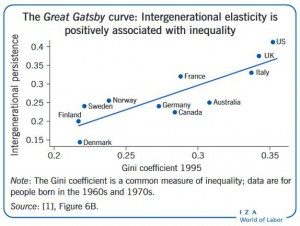 The UN has proclaimed February 20 the “World Day of Social Justice” to support efforts of the international community in poverty eradication, the promotion of full employment and decent work, gender equity and access to social well-being and justice for all. Despite substantial progress in the fight against poverty across the globe, the unequal distribution of income and opportunity between different groups in society features prominently in current political debates.
The UN has proclaimed February 20 the “World Day of Social Justice” to support efforts of the international community in poverty eradication, the promotion of full employment and decent work, gender equity and access to social well-being and justice for all. Despite substantial progress in the fight against poverty across the globe, the unequal distribution of income and opportunity between different groups in society features prominently in current political debates.
IZA World of Labor provides evidence-based insights from international research into various aspects of economic inequality. Here is an overview of related articles.
If you are born poor you will always be poor?
Income inequality and social origins
Promoting intergenerational mobility may make societies both more egalitarian and more efficient. The expectation that people, whatever their social origin, can raise their standard of living is a powerful incentive to human capital accumulation and personal effort. Policies to counteract disparities in family background, such as education interventions for poor children, may foster intergenerational mobility (Lorenzo Cappellari).
Does inequality persist across generations?
A strong association between incomes across generations—with children from poor families likely to be poor as adults—is frequently considered an indicator of insufficient equality of opportunity. Studies of such “intergenerational persistence,” or lack of intergenerational mobility, are concerned with measuring the strength of the relationship between parents’ socio-economic status and that of their children as adults. However, reliable measurement requires overcoming important data and methodological difficulties (Jo Blanden).
Not all people who are poor are persistently poor
Evidence suggests that unemployment, retirement, and single parenthood are closely associated with persistent poverty and that higher education tends to protect against it. There is also evidence of a poverty trap, meaning that policy should aim to prevent people from falling into poverty because once poor, the probability of being poor in the future increases (Martin Biewen).
What can be done to counteract inequality?
Do skills matter for wage inequality?
Differences in wage inequality across countries are driven primarily by differences in the return to skills, which is determined in part by labor market institutions, but also by how well the supply of skills meets the demand. A comprehensive policy package to tackle wage inequality should include a focus on skills, reforms of labor market institutions that influence how skills are rewarded, and alignment of skill supply and demand (Stijn Broecke).
Can social security programs reduce wealth inequality?
How well social security programs reduce inequality depends on program design and implementation and labor market and population characteristics. To reduce inequality and avoid labor market disincentives, the best design appears to be a mostly proportional contributory program complemented by a well-designed non-contributory component (Alvaro Forteza).
The integration of productive inclusion programs into social assistance systems can reduce poverty
However, productive inclusion will not work for everybody, and even when it shows impacts some households—especially the poorest and most marginalized—will still need assistance. To maximize impacts, it is important to tailor productive inclusion programs to match the beneficiaries’ profiles. Furthermore, the right monetary and design incentives must be provided so that social and productive inclusion programs can effectively coordinate activities, exchange information, and refer beneficiaries (Jamele Rigolini).
Can education reduce inequality?
What role does preschool play in reducing inequality?
Good-quality preschool programs more than pay for themselves by boosting achievement and reducing inequality of achievement. That is good news, especially for countries with persistent and high levels of inequality—and a good reason to expand preschool programs in countries where enrollment is far from universal (Jane Waldfogel).
Can higher education reduce inequality in developing countries?
Projections indicate that the global labor market will face continued disequilibrium. Excess labor supply is expected from less developed regions, while excess demand is expected from developed and emerging economies. At the same time, the global economy is becoming increasingly knowledge-driven. Hence, investment in vocational and higher education is important for developing countries to remain competitive; further, expanding the skill-base of the labor force may lead to lower levels of wealth inequality (Abebe Shimeles).
Slavery, racial inequality, and education
Evidence suggests that in some countries historical slavery has influenced the racial distribution of human capital and income inequality. A regional comparison of the influence of slavery on education, racial education inequality, and income distribution shows that policies aimed at addressing inequality can account for differential effects of past slavery on current outcomes. Policies designed to remove racial education inequalities in schools can favor income equalization, though given the resilience of the effect of past slavery they are by no means an immediate solution. Nevertheless, education policy clearly has a strong influence over time (Graziella Bertocchi).
Economic inequality in the news…
- German children from low-educated families less likely to succeed academically
- Americans received a pay rise in 2015
- Barclays to consider living wage for all staff
- UK government announces plans to allow workers to keep tips
- Ikea to pay UK staff living wage
- Is unequal schooling to blame for US racial wage gap?